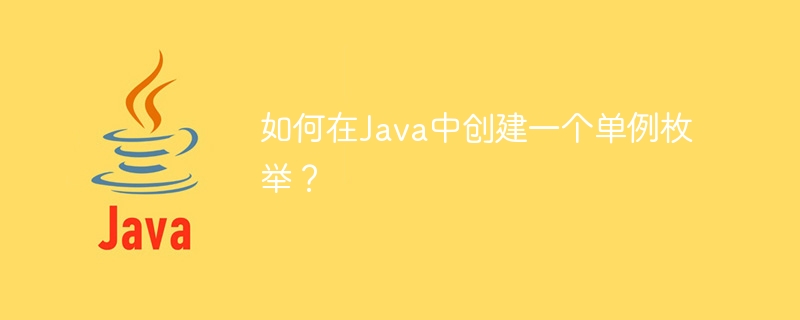How to create a singleton enum in Java?

Singleton pattern limits the instantiation of a class to one object. INSTANCE is a public static final field that represents an enumeration instance. We can get an instance of a class using EnumSingleton.INSTANCE but it is better to encapsulate it in a getter in case we want to change the implementation.
There are a few reasons why we can use enums as singletons in Java
- Guaranteed one instance (multiple enums cannot be instantiated even through reflection).
- Thread safety.
- Serialization.
Syntax
public enum Singleton {
INSTANCE;
private singleton() {
}
}Example
public enum EnumSingleton {
<strong>INSTANCE</strong>;
private String name;
private int age;
private void build(SingletonBuilder builder) {
this.name = builder.name;
this.age = builder.age;
}
public static EnumSingleton getSingleton() { <strong>// static getter</strong>
return <strong>INSTANCE</strong>;
}
public void print() {
System.out.println("Name: "+name + ", age: "+age);
}
public static class SingletonBuilder {
private final String name;
private int age;
private SingletonBuilder() {
name = null;
}
public SingletonBuilder(String name) {
this.name = name;
}
public SingletonBuilder age(int age) {
this.age = age;
return this;
}
public void build() {
EnumSingleton.INSTANCE.build(this);
}
}
public static void main(String[] args) {
new SingletonBuilder("Adithya").age(25).build();
EnumSingleton.getSingleton().print();
}
}Output
Name: Adithya, age: 25
The above is the detailed content of How to create a singleton enum in Java?. For more information, please follow other related articles on the PHP Chinese website!

Hot AI Tools

Undresser.AI Undress
AI-powered app for creating realistic nude photos

AI Clothes Remover
Online AI tool for removing clothes from photos.

Undress AI Tool
Undress images for free

Clothoff.io
AI clothes remover

AI Hentai Generator
Generate AI Hentai for free.

Hot Article

Hot Tools

Notepad++7.3.1
Easy-to-use and free code editor

SublimeText3 Chinese version
Chinese version, very easy to use

Zend Studio 13.0.1
Powerful PHP integrated development environment

Dreamweaver CS6
Visual web development tools

SublimeText3 Mac version
God-level code editing software (SublimeText3)

Hot Topics
 Square Root in Java
Aug 30, 2024 pm 04:26 PM
Square Root in Java
Aug 30, 2024 pm 04:26 PM
Guide to Square Root in Java. Here we discuss how Square Root works in Java with example and its code implementation respectively.
 Perfect Number in Java
Aug 30, 2024 pm 04:28 PM
Perfect Number in Java
Aug 30, 2024 pm 04:28 PM
Guide to Perfect Number in Java. Here we discuss the Definition, How to check Perfect number in Java?, examples with code implementation.
 Random Number Generator in Java
Aug 30, 2024 pm 04:27 PM
Random Number Generator in Java
Aug 30, 2024 pm 04:27 PM
Guide to Random Number Generator in Java. Here we discuss Functions in Java with examples and two different Generators with ther examples.
 Armstrong Number in Java
Aug 30, 2024 pm 04:26 PM
Armstrong Number in Java
Aug 30, 2024 pm 04:26 PM
Guide to the Armstrong Number in Java. Here we discuss an introduction to Armstrong's number in java along with some of the code.
 Weka in Java
Aug 30, 2024 pm 04:28 PM
Weka in Java
Aug 30, 2024 pm 04:28 PM
Guide to Weka in Java. Here we discuss the Introduction, how to use weka java, the type of platform, and advantages with examples.
 Smith Number in Java
Aug 30, 2024 pm 04:28 PM
Smith Number in Java
Aug 30, 2024 pm 04:28 PM
Guide to Smith Number in Java. Here we discuss the Definition, How to check smith number in Java? example with code implementation.
 Java Spring Interview Questions
Aug 30, 2024 pm 04:29 PM
Java Spring Interview Questions
Aug 30, 2024 pm 04:29 PM
In this article, we have kept the most asked Java Spring Interview Questions with their detailed answers. So that you can crack the interview.
 Break or return from Java 8 stream forEach?
Feb 07, 2025 pm 12:09 PM
Break or return from Java 8 stream forEach?
Feb 07, 2025 pm 12:09 PM
Java 8 introduces the Stream API, providing a powerful and expressive way to process data collections. However, a common question when using Stream is: How to break or return from a forEach operation? Traditional loops allow for early interruption or return, but Stream's forEach method does not directly support this method. This article will explain the reasons and explore alternative methods for implementing premature termination in Stream processing systems. Further reading: Java Stream API improvements Understand Stream forEach The forEach method is a terminal operation that performs one operation on each element in the Stream. Its design intention is






